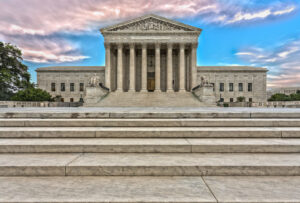Maine’s religious schools’ ‘hands are tied’ even after Supreme Court ruling opening door to state tuition funding
Thanks to a Supreme…


Maine Attorney General Aaron Frey opposes religious school participation in the state’s tuition program.
Thanks to a Supreme Court ruling in June, religious schools in Maine can participate in the state’s tuition program. So why aren’t they signing up?
“Their hands are tied. The state said you can take the money, but we’ll tie your hands,” Maine parent David Carson, whose family was a plaintiff in the case, Carson v. Makin, told the Associated Press.
The hand-tying is a reference to state Attorney General Aaron Frey’s statement about the case, released on the same day of the Court’s ruling, denigrating religious schools’ beliefs and religious practices and warning that religious schools will have to abide by the state’s anti-discrimination laws in the Maine Human Rights Act.
“The education provided by the schools at issue here [i.e., religious schools] is inimical to a public education,” Frey claimed. “They promote a single religion to the exclusion of all others, refuse to admit gay and transgender children, and openly discriminate in hiring teachers and staff.”
In other words, as one legal analyst explained, “Religious schools can participate in the state’s tuition assistance programs as long as they’re not religious, Frey says.”
In an op-ed in the Bangor Daily News, Jacob Posik, of the Maine Policy Institute, took issue with Frey’s actions.
“[I]t was a surprise to literally no one that this is where the high court would come down on Carson,” Posik wrote. “Yet the attorney general acted shocked by the decision, and is scrambling to change the statute.”
“I found it quite remarkable that, following the ruling, the attorney general’s office and Attorney General Aaron Frey himself immediately began reiterating arguments that the Supreme Court rejected,” Posik also wrote.
Other critics were similarly puzzled by Frey’s reaction.
“Our AG‘s response to losing this case was simultaneously baffling and offensive,” Carroll Conley, executive director of the Christian Civic League of Maine, told Fox News Digital. “His assertion that sectarian schools are ‘inimical to a public education’ simply for not aligning with the state’s orthodoxy regarding human sexuality is the very definition of bigotry.”
Maine’s tuition program was set up to help cover the education costs of students who don’t have a public option. Only 143 of Maine’s 260 school districts have a public high school.
But since the 1980s, the program has excluded religious schools, dubbed ‘sectarian’ schools by a state statute. That exclusion was struck down as unconstitutional in June’s Supreme Court case.
“That is discrimination against religion,” Chief Justice John Roberts wrote in the majority opinion. “A state’s anti-establishment (of religion) interest does not justify enactments that exclude some members of the community from an otherwise generally available public benefit because of their religious exercise.”
With the door open to state tuition dollars, however, only one religious school has signed up for the program, Marcus Mrowka, a state education spokesperson, told the AP last month.
Bangor Christian Schools president Tom Brown told the AP in an email that “we are processing” the attorney general’s statement, saying that no Bangor students will be receiving state tuition in the fall.
Carson, whose daughter has since left Bangor Christian Schools and is enrolled in college, expressed disappointment in the situation caused by the attorney general.
“It’s disappointing when you do all this and nothing happens,” Carson said. “It’s kind of a circus to me. The Supreme Court says one thing, but the state attorney general just does what he wants to do.”



